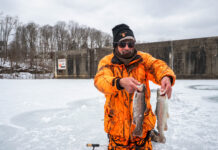UNIVERSITY PARK, Pa. – Spring on the farm brings the arrival of baby animals in greening pastures, but potentially dangerous situations can arise when working around farm livestock this time of year.
Cute babies, dangerous mom. “Baby animals are cute and often irresistible to children,” said Robert Mikesell, Penn State senior extension associate in dairy and animal sciences. “However, mothers are often very protective of their offspring.
“Beef cows with baby calves sometimes injure their handlers; even females that are normally mild mannered can become dangerous when protecting their young.”
Handle with care. Mikesell said handlers need to be cautious when dealing with baby animals during normal management procedures, and if children are learning to accomplish these tasks, adults should safely separate the young animals from their mothers before they begin working.
Other dangerous situations can arise anytime people interact with livestock or perform routine management practices.
“Bulls, boars, rams, and billy goats should always be considered potentially dangerous, with mature males being the most cantankerous,” said Mikesell. “These males can all exhibit unpredictable behavior and should be approached and handled with caution.”
An obstruction should be kept between the handler and the animal, and intact males should only be handled with two or more people, he recommends.
“Children should never be allowed near intact males, particularly in confined spaces.”
Loading risks. Mikesell said moving, loading, and unloading livestock also causes injuries each year.
“Only a few animals should be moved at a time, and solid, well-anchored gates or panels should be used to block paths of escape.”
In addition, Mikesell said handlers should stay out of situations where they could be crushed by large animals.
“Most injuries result from a combination of frightened animals and impatience on the handler’s part. Animals should be moved slowly, given ample time to investigate, and have no choice but to move where they are being directed,” he explains.
Needle sticks. Injuries can also be caused by equipment used to perform basic management practices.
Accidental needle sticks and scalpel blade cuts are two risks that can be reduced by properly restraining animals when these tools are used, Mikesell said. Accidental needle sticks, besides injuring the skin, may also result in inadvertent injection of medication or animal health product.
Disease prevention. Handlers also need to take care to prevent the spread of diseases from infected livestock.
Some diseases such as ringworm, salmonella, and certain dangerous strains of E. coli can cause human disease, Mikesell said. He recommends farmers practice good hygiene by using disposable gloves when handling animals and washing hands.
Get 4 Weeks of Farm and Dairy Home Delivered









